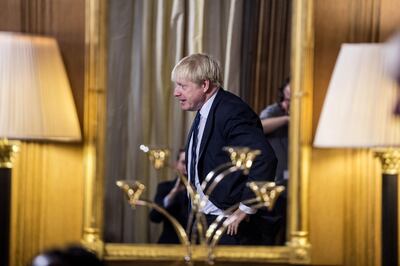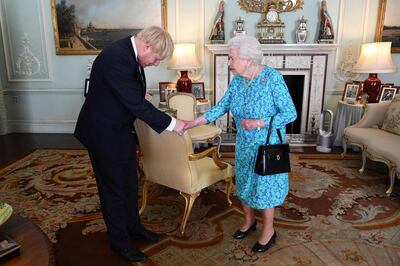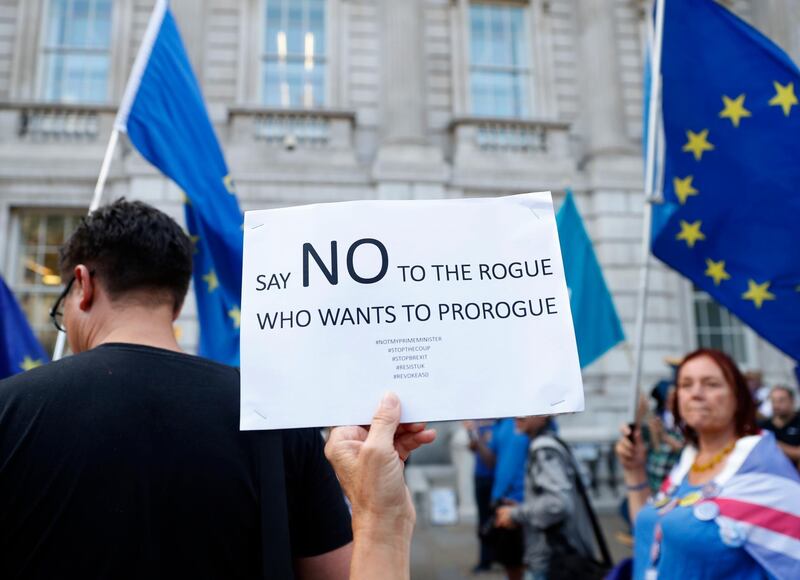If all goes to Boris Johnson’s plan, a man in tights with an ebony staff, known as Black Rod, will bang on the House of Commons’ door three times on October 14 to summons MPs to hear the Queen's speech formally opening parliament – thus paving the way for a new programme of government.
The ceremonial state opening of parliament commemorates a famous refusal to hand over five of its own members to a dictatorial king in 1642. The showdown is remembered as the trigger for the subsequent English civil war and the beheading of King Charles I.
Mr Johnson's decision to suspend parliament for five weeks from September 9 is a bold move, with great historical resonance. It is a hammer blow in the great Brexit struggle.
If the plan goes wrong, the courts will have stopped the British prime minister is his tracks. Or his political rivals will orchestrate a successful parliamentary revolt later this week.

While Brexit has been tearing apart British politics since 2016, the crisis is now one of Mr Johnson's own making. In acting decisively and unilaterally, he has raised the odds that he will prevail over proceedings for the next few weeks but he is gambling everything to do so.
There many British Conservatives who find the prime minister’s methods distasteful but refuse to speak out against the suspension of parliament.
Referring to the depth of the Brexit divisions, one lawmaker described to me two separate democratic eco-systems at work in the UK. First there is the battle for voters wanting to leave the EU, currently being fought between the Conservative Party and the insurgent Brexit Party. Separately there is the battle to represent voters who wish to remain, being fought between the Labour Party, Liberal Democrats and assorted smaller forces.
This bipolar struggle is at work within a single constitutional framework. Mr Johnson is ruthlessly exploiting every tool he can find so that he can triumph on the side of Brexit. He also hopes the Leave camp will win the deadlock over Remain as that process enters the endgame.
The challenge to the constitution is that MPs rejected Theresa May’s deal with Brussels three times but failed to support an alternative when they seized control of the agenda in an unprecedented assertion of parliamentary supremacy.
In a hot mic moment, Ben Wallace, the defence secretary, last week admitted Mr Johnson was trying to break a logjam that had become intolerable. “Our system is a winner-takes-all system. If you win a parliamentary majority, you control the timetable,” he said. “We’ve suddenly found ourselves with no majority and a coalition and that’s not easy for our system.”
In the circumstances, there are many politicians awed by the contrast between Mr Johnson's willingness to use his prime ministerial powers to change the political weather and Mrs May's politics of the dead hand.
By constantly choosing the least risky option, Mrs May continually painted her leadership into a corner and lacked the imagination to escape the traps of her own making. Mr Wallace went on to concede the success of the prime minister’s gambit was not guaranteed. But those around the prime minister say he is at least trying to engineer a breakthrough rather than glumly accepting an ill-starred resolution as the only available option.
Mr Johnson is on a mission with a single endpoint. He has promised October 31 as the date Britain leaves the EU. If he achieves that exit point, he will have delivered on his promise and established his political credibility.
With just two months to deadline, the hurdles in his way are formidable.
This week his predecessor Sir John Major and the campaigner and businesswoman Gina Miller will seek a court injunction to stop the suspension of parliament. The argument is a fine one: not that Queen Elizabeth II's order of prorogation was illegitimate but that Mr Johnson was not acting in good faith in advising the monarch.

Downing St has stated the prorogation allows the new government to set out its own legislative agenda. When critics cry it is shutting down parliament to prevent the adoption of no-deal legislation, officials point out that there would have been a recess anyway from mid-September 13 to early October, meaning between three and eight additional parliamentary days will be lost.
The courts will hear the government’s actual purpose is to scupper parliamentary resistance. No-deal opponents were planning to scrap or curtail the shorter break from mid-September for party conferences. When every sitting could produce a decisive defeat, five days is crucial time lost. Without a majority, Mr Johnson is a hostage of parliament.
None of this scheming will determine the nature of Brexit. There is an entirely separate battle of wills with other EU governments over Mr Johnson's proposals for a fresh deal with Brussels.
This is, most likely, about a forthcoming general election. If the majority of MPs vote against the government, a formal process takes place under the Fixed-term Parliaments Act, whereby an alternative government can attempt to secure a majority in a fortnight. If it doesn't, a general election becomes inevitable.
Mr Johnson knows he cannot govern without a majority. His gamble is that his do-or-die determination can deliver victory at the polls before the year ends.





